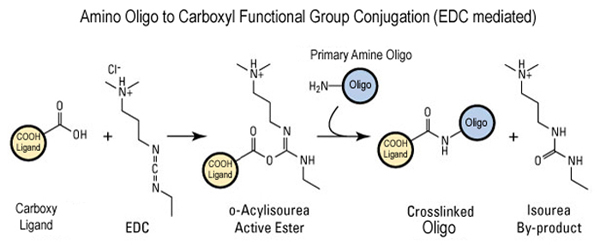.png)
Modification : PC Amino C6 (Photocleavable)
Catalog Reference Number
Category
Modification Code
5 Prime
3 Prime
Internal
Molecular Weight (mw)
Extinction Coeficient (ec)
Technical Info (pdf)
Absorbance MAX
Emission MAX
Absorbance EC
26-6690
Photo Cleavable
[PCAmC6]
Y
N
N
371.32
-
PS26-6690.pdf
-
-
-
| Catalog No | Scale | Price |
| 26-6690-05 | 50 nmol | $184.00 |
| 26-6690-02 | 200 nmol | $184.00 |
| 26-6690-01 | 1 umol | $227.00 |
| 26-6690-03 | 2 umol | $356.00 |
| 26-6690-06 | 5 umol | $1,021.50 |
| 26-6690-10 | 10 umol | $1,814.00 |
| 26-6690-15 | 15 umol | $2,268.00 |
| Discounts are available for PC Amino C6 (Photocleavable)! |
| Modification* Discount Price Structure |
|
1 site/order
|
List price
|
|
2 sites/order
|
10% discount
|
|
3 sites/order
|
20% discount
|
|
4 sites/order
|
30% discount
|
|
5-9 sites/order
|
50% discount
|
|
10+ sites/order
|
60% discount
|
|
*Exceptions apply
|
PC Amino C6 (photocleavable) is a non-nucleosidic moiety that can be used to incorporate a UV photo-cleavable primary amino group onto the 5' end of an oligonucleotide. The amino group is separated from the ' end nucleotide base by the photo-cleavable group and a 6-carbon spacer arm to minimize steric interaction between the amino group and the oligo (1). The presence of the amino group allows the user to end label the oligo with a variety of different affinity, reporter or protein moieties (as NHS esters or isothiocyanates), as well as immobilization on an activated solid support, depending on the application. Examples include biotin, digoxigenin, and fluorescent dyes or quenchers, enzymes (for example, alkaline phosphatase), and NHS-labeled beads. The photo-cleavable, located on the 5' phosphate can be selectively cleaved by illumination with UV light, thereby releasing the marker moiety or detachment of the oligo from the solid support (1). The released oligo will have a 5-phosphate.
An interesting application of PC Amino C6 is to use it to make a set of photo-cleavable peptide-DNA conjugates for use as photo-cleavable mass marker (PCMM) hybridization probes for detection of immobilized target DNA sequences by matrix-assisted laser desorption ionization (MALDI mass spectrometry (2). Here, a DNA oligonucleotide functions as the hybridization probe; the peptide is then released by UV photo-cleavage during the ionization/desorption phase of UV-MALDI, and thus serves as a specific marker (mass tag) that identifies the presence of the target sequence.
PC Amino C6 could also be used to create "caged" oligonucleotides, that is, oligonucleotides whose activity is suppressed until released by an external factor (such as UV light). Caging oligonucleotides (for example, tethering anti-sense or siRNA, via PC Amino C6, to a molecule that suppressed its activity) would provide new possibilities for controlling biological mechanisms (such as gene expression) in space and time (3).
Cleavage Protocol
Cleavage occurs by irradiation with near-UV light (300-350 nm, complete cleavage occurs within 5 minutes. Try using a Black Ray XX-15 UV lamp (Ultraviolet Products Inc., San Gabriel, CA) at a distance of 15 cm (emission peak 365 nm, 300 nm cut-off, 1.1 mW intensity at~31 cm).
NHS ester-activated ligands react with primary amines to yield stable amide bonds. The reaction releases N-hydroxysuccinimide (NHS). NHS ester reaction scheme for chemical conjugation to a primary amine in an oligo is given below.

-
The primary amine labelled oligos can also be conjugated to carboxyl functional groups usually for solid supports applications using EDC mediated reaction as shown in the figure below.

References
1. Olejnik, J., Krzymanska-Olejnik, E., Rothschild, K.J. Photocleavable aminotag phosphoramidites for 5’-termini DNA/RNA labeling.
Nucleic Acids Res. (1998),
26: 3572-3576.
2. Olejnik, J., Ludemann, H-C., Olejnik, E.K, Berkenkamp, S., Hillenkamp, F., Rothschild, K.J. Photocleavable peptide-DNA conjugates: synthesis and applications to DNA analysis using MALDI-MS.
Nucleic Acids Res. (1999),
27: 4626-4631.
3. Tang, X., Su, M., Yu, LiLi, Lv, C., Wang, J., Li, Z. Photomodulating RNA cleavage using photolabile circular antisense oligodeoxynucleotides.
Nucleic Acids Res. (2002),
38: 3848-3855.
- PC Amino C6 (Photocleavable)
